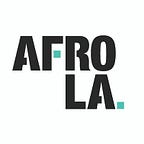By Heather Wang
Heather Wang is AfroLA’s first community engagement fellow. She’s coordinating audience engagement efforts which include a community information needs survey. Her work with AfroLA is generously funded by the Reynolds Journalism Institute at the University of Missouri.
I was born and raised in Beijing. In China, I always heard negative stereotypes and misrepresentations of Black people. Three years ago, after I told my driving teacher that I planned to move to the U.S., he said, “Most Black people are lazy. Stay away from them when you go to America.”
I asked him if he had actually ever met or talked with any Black people. “No,” he said, “But, don’t you watch TV and read the news?”
What I didn’t understand then is how people in my country could have such racist attitudes about a group of people they’d never interacted with, or even met.
I gradually realized that the answer is…not black and white. Growing up, I predominantly saw misrepresentations and stereotypes of Black people portrayed in the media. Did Chinese journalists intentionally misrepresent Black people? Working in several Chinese newsrooms during my first two years of college, I realized that nearly none of the journalists around me had ever met any Black people, like my driving teacher. Their informational sources were from American news outlets.
Admittedly, Chinese journalists may exaggerate misrepresentations in American news as they use it to back their own reporting or just translate it for a Chinese audience. But, if representations of Black people in American news media were more comprehensive, more nuanced and more accurate in the first place, would things be different?
When I moved to the U.S. to attend journalism school last year, these questions were still on my mind. As I’ve studied, I realize now that the mainstream media loves reporting on extremes: the Black man who is a “dangerous” criminal to be feared; the “exceptional” Black student from a poor school who earned a scholarship to an elite college. The stories in the middle, the everyday, are left untold. We ignore the corner store owner loved by all the neighborhood kids, the veteran who’s supporting struggling vets in the community.
We can’t underestimate the power and influence of local news in this country. Local news not only affects local communities, there is a global ripple effect — especially local news in big cities like Los Angeles. Ignoring the people in the middle, treating Black people as monolithic or extraordinarily good or bad has real-life consequences.
My driving teacher undoubtedly made a ridiculous, racist comment about Black people as a whole. But, his attitude changed when I brought Barack Obama, the first Black president, into this conversation.
“Well, Obama is a smart and good guy,” he said, “But there is only one Obama.”
I gave up trying to convince him otherwise. For him, and other stubborn people like him, we have to do more than talk. We have to force radical change.
Making every “normal” Black person visible is how AfroLA is trying to be part of that change. The goal is to provide coverage of issues that matter to any Angeleno who reads, but to deliver that news with a distinctly Black voice that emphasizes the news’s impact on the Black community. We are tired of local news that doesn’t scratch the surface of the communities it covers.
There are millions of ignorant people like my driving teacher whose racism is influenced by what they see in the media. Therefore, what we need is high-quality Black news to break those harmful stereotypes. As the first link in the chain of news’ spread, local news — like AfroLA — is critically important.
AfroLA officially launches in early 2023, but we’ve already started producing quality journalism for L.A.’s Black community.
- Explore the archive of AfroLA’s pre-launch stories.
- Support our journalism with a tax-deductible donation.
- Sign up for our newsletter.
- Connect with us on Twitter, Instagram, LinkedIn and Facebook.
Heather Wang is an international student earning her bachelor’s degree in data journalism and broadcasting at the University of Missouri, Columbia. Born and raised in Beijing, she moved to the U.S. in 2021. Heather loves telling data-driven stories, especially those that focus on underserved communities. Her work includes a multimedia website on HIV aimed to stop the spread among Chinese college students. She believes that data may look tedious, but there are interesting stories to be told from it. With a cross-cultural background, Heather is eager to bring new ideas to AfroLA.
